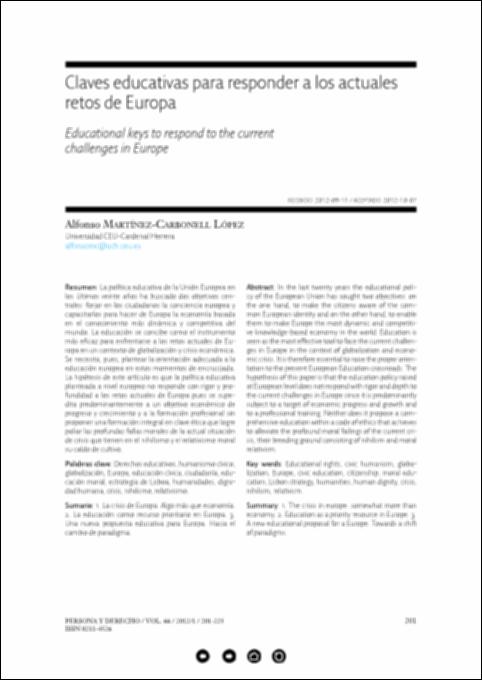Por favor, use este identificador para citar o enlazar este ítem:
http://hdl.handle.net/10637/7797Claves educativas para responder a los actuales retos de Europa
| Título : | Claves educativas para responder a los actuales retos de Europa |
| Otros títulos: | Educational keys to respond to the current challenges in Europe |
| Autor : | Martínez-Carbonell López, Alfonso |
| Materias: | Education and State - European Union countries.; Humanismo.; Educación y Estado.; Education and State.; Humanism.; Países de la Unión Europea - Política educativa. |
| Editorial : | Universidad de Navarra. |
| Citación : | Martínez-Carbonell López, A. (2012). "Claves educativas para responder a los actuales retos de Europa = Educational keys to respond to the current challenges in Europe". Persona y derecho : revista de fundamentación de las Instituciones Jurídicas y de Derechos Humanos, vol. 66, pp. 201-225. |
| Resumen : | La política educativa de la Unión Europea en los últimos veinte años ha buscado dos objetivos centrales: forjar en los ciudadanos la conciencia europea y capacitarlos para hacer de Europa la economía basada en el conocimiento más dinámica y competitiva del mundo. La educación se concibe como el instrumento más eficaz para enfrentarse a los retos actuales de Europa en un contexto de globalización y crisis económica. Se necesita, pues, plantear la orientación adecuada a la educación europea en estos momentos de encrucijada. La hipótesis de este artículo es que la política educativa planteada a nivel europeo no responde con rigor y profundidad a los retos actuales de Europa pues se supedita predominantemente a un objetivo económico de progreso y crecimiento y a la formación profesional sin proponer una formación integral en clave ética que logre paliar las profundas fallas morales de la actual situación de crisis que tienen en el nihilismo y el relativismo moral su caldo de cultivo. In the last twenty years the educational policy of the European Union has sought two objectives: on the one hand, to make the citizens aware of the common European identity and on the other hand, to enable them to make Europe the most dynamic and competitive knowledge-based economy in the world. Education is seen as the most effective tool to face the current challenges in Europe in the context of globalization and economic crisis. It is therefore essential to raise the proper orientation to the present European Education crossroads. The hypothesis of this paper is that the education policy raised at European level does not respond with rigor and depth to the current challenges in Europe since it is predominantly subject to a target of economic progress and growth and to a professional training. Neither does it propose a comprehensive education within a code of ethics that achieves to alleviate the profound moral failings of the current crisis, their breeding ground consisting of nihilism and moral relativism. |
| URI : | http://hdl.handle.net/10637/7797 |
| Derechos: | http://creativecommons.org/licenses/by-nc-nd/4.0/deed.es |
| ISSN : | 0211-4526. 2254-6243 (Electrónico) |
| Fecha de publicación : | 1-ene-2012 |
| Centro : | Universidad Cardenal Herrera-CEU |
| Aparece en las colecciones: | Dpto. Ciencias Políticas, Ética y Sociología |
Los ítems de DSpace están protegidos por copyright, con todos los derechos reservados, a menos que se indique lo contrario.


